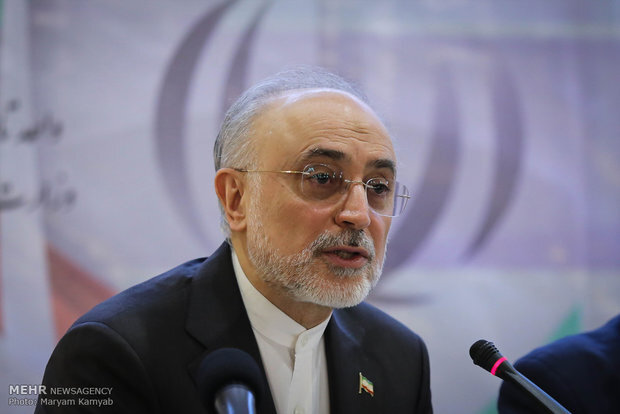Salehi says Iran able to add 20,000 SWUs in a month

TEHRAN - Ali Akbar Salehi, director of the Atomic Energy Organization of Iran (AEOI), said on Thursday that his organization can add 20,000 SWUs (Separative Work Unit) in a month to increase its nuclear enrichment capacity.
Iran has started to gradually reduce its commitments to the 2015 nuclear deal in response to the U.S. which abandoned the landmark deal in May 2018 and reinstituted sanctions.
So far, the AEOI has taken four steps to cut back commitments in accordance to paragraph 36 of the JCPOA which “allows one side, under certain circumstances, to stop complying with the deal if the other side is out of compliance.”
Talking on the radio, Salehi said Iran had about 6,000 operational SWUs but it has added 3,000 in a short time.
“Previously, we had about 6,000 SWUs but we added about 3,000… and I insist that we are able to increase this capacity to over 20,000 SWUs in a month,” stated Salehi, a nuclear physicist.
In an open reference to the U.S. abrogation of the nuclear pact and Iran’s response, Salehi said, “The other side is now a loser in the face of a political challenge that it has created, and now it is seeking an exit route from this deadlock.”
Iran has repeatedly said if the European parties to the nuclear deal shield its economy from the U.S. sanctions it will reverse its decisions.
Under the nuclear agreement, officially called the Joint Comprehensive Plan of Action (JCPOA) Iran agreed to put limits on its nuclear program in exchange for the termination of economic and financial sanctions.
Salehi said the Europeans are aware that Iran will not remain silent if they continue to remain passive in the face of sanctions in violation of their commitments.
Iran started injecting uranium gas into 1,044 centrifuges at the Fordow nuclear site on November 6. It was done at the presence of inspectors from the International Atomic Energy Agency (IAEA).
On May 8, exactly one year after the U.S. abandoned the deal, Tehran said its “strategic patience” is over and began to partially reduce its commitments to the agreement at bi-monthly intervals.
In the first stage, Iran announced that it will not limit its stockpile of the nuclear fuel to 300 kilograms allowed under the deal. On that date (May 8) Iran’s Supreme National Security Council (SNSC) said if the remaining parties to the JCPOA, especially Europeans, devise a mechanism to protect Iran from the sanctions’ effect in the two-month deadline it will reverse its decision.
But since European parties missed the deadline, on July 7 Iran announced that it has started enriching uranium to a higher purity than the 3.67%, thereby starting the second step.
Again, as Europe missed the second 60-day deadline, Iran moved to take the third step, removing a ban on nuclear research and development (R&D).
NA/PA
Leave a Comment